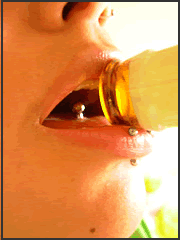 New Girlguiding UK and Mental Health Foundation research shows pressures of premature sexualization, materialism and boredom are taking a toll on the mental health and emotional wellbeing of girls and young women.
New Girlguiding UK and Mental Health Foundation research shows pressures of premature sexualization, materialism and boredom are taking a toll on the mental health and emotional wellbeing of girls and young women.
The report, A Generation Under Stress has been published today in partnership with the Mental Health Foundation.
The research was run among girls in guiding between ten and fourteen, through focus groups conducted by Opinion Leader and an online quantitative survey. [continue reading…]
 Immune cells (stained blue) end in protective caps called telomeres (stained yellow) that are shorter in persons suffering chronic stress. A new UCLA study suggests cortisol is the culprit behind the telomeres’ premature aging.
Immune cells (stained blue) end in protective caps called telomeres (stained yellow) that are shorter in persons suffering chronic stress. A new UCLA study suggests cortisol is the culprit behind the telomeres’ premature aging.
Every cell contains a tiny clock called a telomere, which shortens each time the cell divides. Short telomeres are linked to a range of human diseases, including HIV, osteoporosis, heart disease and aging. Previous studies show that an enzyme within the cell, called telomerase, keeps immune cells young by preserving their telomere length and ability to continue dividing. [continue reading…]

Â
One billion young people today are maturing emotionally, connecting socially and exploring their sexuality. To help them avoid risky behaviors, researchers first have to understand them.
Around the globe, more than 1 billion young people, ages 15 to 24, are making the often-difficult transition to adulthood. They are changing physically, maturing emotionally, connecting socially and having sex with each other. But the consequences aren’t as simple as they may once have been. The global economy is changing, and in most countries, young people need higher education to keep pace economically. As a result, the age of marriage is drifting upward. More adolescents are finding themselves exploring their sexuality outside of marriage, resulting in more out-of-wedlock pregnancies and births.Â
Link to read more:
Generation Sex
Understanding Teens
Helping Teens
Source: Johns Hopkins Bloomberg School of Public Health
Image credit
 The rise in binge drinking in the young is a “fashion phenomenon” where drinkers are copying their associates’ behaviour, new research has shown.
The rise in binge drinking in the young is a “fashion phenomenon” where drinkers are copying their associates’ behaviour, new research has shown.
A study conducted at Durham University’s Institute of Advanced Study and Volterra Consulting UK shows that social networking is a key factor in the spread of the rapid consumption of large amounts of alcohol – binge drinking – which is blamed for serious anti-social and criminal behaviour.
Researchers say the findings have major implications for Government policy makers charged with tackling the problem, which has longer-term and costly health implications for the nation. [continue reading…]
 New Girlguiding UK and Mental Health Foundation research shows pressures of premature sexualization, materialism and boredom are taking a toll on the mental health and emotional wellbeing of girls and young women.
New Girlguiding UK and Mental Health Foundation research shows pressures of premature sexualization, materialism and boredom are taking a toll on the mental health and emotional wellbeing of girls and young women.


